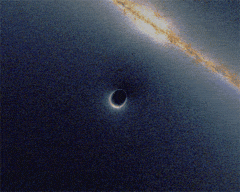
I was expecting a whirlpool in 3D and the matter glowing from friction as it nears the center, as I expected a event horizon to be negligible visually.
How does this depiction work? How big is the central sphere? I am puzzled by the perpendicular circles. Are they the event horizons if they are both visible? What would be a path of a particle as it gets swallowed into the singularity?
Answer
First note that this is a fictional movie and the image is an artist's impression, not a detailed simulation. The public seems to think the movie is some sort of fictionalized documentary, which it never claimed to be. That said, the image is qualitatively conveying some of what happens near a black hole.
The diagonal disk is the accretion disk -- this is where matter is spiraling inward due to gravity, friction, and electromagnetic forces too. It glows because it is very hot.
The circular ring is the result of gravity bending the light emitted from the far side of the accretion disk into our line of sight. A similar effect happens when the light source is much farther behind the black hole, as seen in this Wikimedia image:

As for event horizons, no, you would only see the outer one by definition. (An event horizon is nothing more or less than a surface which delineates which regions of spacetime can communicate with each other.) Since the image in question is made for primarily artistic purposes, I wouldn't try to read too much into details that you see.
No comments:
Post a Comment